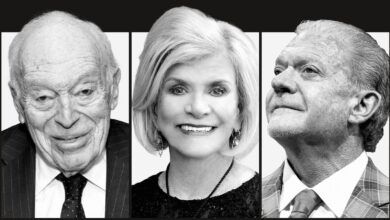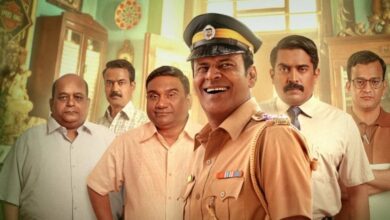John Fogerty On CCR, Springsteen, Dylan, Veterans

📝 usncan Note: John Fogerty On CCR, Springsteen, Dylan, Veterans
Disclaimer: This content has been prepared based on currently trending topics to increase your awareness.
NEW ORLEANS, LOUISIANA – APRIL 24: John Fogerty performs during 2025 New Orleans Jazz & Heritage Festival at Fair Grounds Race Course on April 24, 2025 in New Orleans, Louisiana. (Photo by Erika Goldring/Getty Images)
Getty Images
Decades before Taylor Swift went to war with Scooter Braun there was John Fogery and Saul Zaentz. Unfortunately, it’s a tale as old as the music industry – an extremely talented, but naïve young artist ends up losing control of the music they created and gifted to the world.
However, just like Swift’s saga, Fogerty’s decades-long battle finally had a happy and just ending. Fogerty had to wait a lot longer, but in 2023, he got back control of the songs he wrote with Creedence Clearwater Revival.
At long last, some of the greatest American songs – “Have You Ever Seen The Rain,” “Proud Mary,” “Born on the Bayou,” “Who’ll Stop The Rain,” “Fortunate Son” and more – were rightfully back with their author, a man Bruce Springsteen referred to as “The Hank Williams of his generation.”
It took a lot of years and a lot of drama that makes the Swift story look like a fairy tale – Fogerty’s dispute involved fracturing his relationship with his own brother, Tom, and even leaving the music industry for a time.
But now 80 years old, reunited with the classics he created, a happy family man, John Fogerty gets to celebrate his place as a true great American artist. On his new album, Legacy: the Creedence Clearwater Revival Years (John’s Version), he revisits 20 of his best-known hits with CCR.
I spoke with Fogerty about the songs then and now.
Steve Baltin: When you were revisiting these songs, were there any you were surprised by how much they changed for you?
John Fogerty: I guess a couple of them. I didn’t quite look at it that way. I think I was really admiring, if I can say that, and still remain humble. I was happy I guess with the shape of the songs, the original recordings. I was very happy there was not a lot of wasted space. In other words, it seemed like I had done a pretty good job back then, even of trying to cut off the excess and just go with the meat.
Baltin: It’s funny you say, if I can say that and remain humble, because these are some of the greatest American songs ever written. Did you appreciate that at the time? Or is it something now that with distance you can appreciate?
Fogerty: I was working really hard to make good music and to write good songs to me that decried a certain type of intensity. And well, here’s an example. Back in the day, I used to tell people, for every song you hear, I’ve written 10 more that you don’t hear. It’s not that those 10 aren’t good, it’s just it takes going through all of that to get to the really good song. What that 10 to one ratio really means is I would start writing a song get in maybe to the second verse and start to feel like, “Wow, am I really committed to this? This doesn’t feel like it’s going to be that great, or I don’t know how to resolve this and get it to the next logical place.” So, I would just turn the page, I’d crumple the paper up and throw that away, literally. I almost never went back. That’s the kind of work I did then. So, when the songs became successful and ultimately very singable by the public, let’s say, I felt that I had earned that, that I’d worked really hard and gotten myself there and gotten the songs there. Also, I used to tell people back in the day, 1970, “I’m trying to make records that they’ll still play in 10 years. That was an audacious expression because in rock and roll, nobody was playing 10-year old records. They just really didn’t do that then. But having said all those things to you, when time goes by and you are still hearing “Born on the Bayou” on the radio or “Down on the Corner,” or “Fortunate Son,” you’re dumbfounded that it’s still relevant. Because I did not count on that. I didn’t know that would happen. As precocious a young person as I might have been, who can know such a thing? So that really surprised me.
Baltin: With these songs are you able to look at them with a little bit of objectivity and understand why they are still played on radio?
Fogerty: Yes, “Proud Mary” Is so resonant to me. To me, “Proud Mary” was the first really good song that I wrote, first classic, you might say. And it also was just about the first song I wrote that was actually really from me, rather than me trying to write a top 40 song, or a British Invasion type song. I was being instructed by the record company, “Well, you need to try and do this to get on the radio, et cetera. “Proud Mary” just came out of my own feelings about the world and about life, about my own life. And that’s still resonant. It just resonates with me. I still feel very comfortable with that song. “Proud Mary” is Americana, it’s got my plaid shirt in it, it’s got my funny way of talking in it, it’s got my total dedication and love of my own country, America, in it. Surprisingly, these weren’t things I set out to do. The song just came out of me, and all those things were in it, but it wasn’t on purpose. It just kind of happened.
Batin: When you hear other people do your songs sometimes, they’ll bring other things to it. Famously, Tina Turner just killed “Proud Mary.” When you listened to her version, did you hear new things in it at all?
Fogerty: Oh, for sure. I still remember the first time I heard her version. I was driving in the car, and it was around seven o ‘clock and it was dark, so it must have been wintertime here in California. That’s our winter, it just gets dark earlier. I loved the slow part at the front. It seemed like, even though I didn’t arrange it that way in my song, I was kind of singing about that feeling. And she sure took that vibe, that, dare I say, antebellum version of America, that whole vibe and put it at the front of her song. She didn’t call it that of course, and then of course went into the absolutely Tina being Tina version for the second half, and those two elements together were just a wonderful presentation of American music.
Baltin: I love revisiting how songs evolve but stay relevant. There are a lot of topical songs, like, “Have You Ever Seen the Rain?” “Fortunate Sun,” that still speak to issues today. Were you surprised by how relevant today some of those songs still are in this day and age in America?
Fogerty: Steve, that’s a fascinating subject. I don’t get too far away from that because especially in the case of “Fortunate Son,” for almost 10 years now, our man in the White House was just a living embodiment of “Fortunate Son,” but then he started using it. It’s just sort of a strange thing, being the guy that wrote that song, the person that was so emotional about what’s in that song. I am amazed at the human condition sometimes. I’m just amazed that this can be sitting there the way it is in front of all of us and he does so it’s amazing that that song is so relevant now.
Baltin: Are there songs that surprise you by how much they still relate to your life today?
Fogerty: I think more that I’m happy that it’s this way. These songs do have quite a bit of my own DNA in them, and I have pretty much remained the same person. I didn’t have some radical shift in my life that turned me into some other person. And therefore, I certainly still back proudly the meaning behind the song as written. I’m surprised though sometimes, it’s when you’re half asleep, these kind of things happen where you wake up remembering a line in one of your own songs, but maybe you actually misremember it a little bit because you’re asleep. And then you put the right word in. “Oh, yeah, I decided to use that word.” And then you laugh. Well, of course you use that word because that says it, doesn’t it? And you’re still affirming that choice all these years later.
Baltin: Can you give me an example? Is there one of those songs that you misremembered?
Fogerty: I can’t think of one offhand. I just know that particularly “Fortunate Son,” because I was writing from a place from, I had been drafted. I was in the military, but I received the draft notice right at the time that most of my generation was absolutely terrified of receiving a draft notice and going into the jungle. It wasn’t the happy prospect that I wanted to do. Number one, most of us didn’t think that that war was in any way, shape, or form good for America or patriotic, or in any sense, something that was a realistic accepted duty for us all. But the other perspective that I had was that, yes, I was in the military. I came back, of course, and my feelings were still the same. I was what you would probably call a hippie in 1967, ’68, ’69. And by that I really just mean a young person becoming very aware of the world and how the world works and very disenchanted with the generation ahead of us who had gotten us into the war and many other things that were not going right, for instance, civil rights. So, I was with my peers, but yet I would be around when many of them would be perhaps at what you call a demonstration in those days, a protest. And there would be lots of soldiers around, either Army or National Guard, and the people who were civilians would be young people, very disparaging about the military. And I’d have to say, “Look, let’s get something straight here. Those guys that are standing over there in uniform didn’t start this. And it’s not their policy. In fact, they don’t get to make any policy. Now look over there and look at that kid over there. You see him? He’s 19 years old. He likes all the same stuff you like. He’s singing the same songs. He hates the frickin war. He hates the army. He wants to be home like you in a civilian life, but he was drafted. You’ve got to understand, he’s just like you. This is not his gig, this war, this oppression coming from the White House.”
Baltin: Do you feel like now you’re able to be an ambassador for that sentiment where people are probably more divided than ever?
Fogerty: Especially now, it’s pretty much knee jerk, “they’re rednecks, and we’re liberals,” that sort of thing. I agree with you that we are very divided, and it’s divided in a different way. I think in the late 60s, it really was generational. I think young people were more than 90 percent in agreement, maybe even more than 95 percent. One of the big phrases back then was don’t trust anyone over 30. And that was more or less the sentiment. It was the older people. It’s old people against young people. That’s the way the world was in 1969. But nowadays, the division is much more political, and there’s not as much age separation. Although, I’m certainly very proud of young people, especially on college campuses the last couple of years, who have been letting the world know how they feel. I’m proud of them. As Americans I’m very proud of them. It’s very hard to fool young people.
Baltin: Are there artists you came up with you admire for the way they’ve evolved?
Fogerty: I didn’t come up with Bruce. I was a little ahead of him, but I certainly love the way Bruce has evolved. He’s still Bruce, he’s still relevant and he’s remained true to himself I think Bob Dylan handles himself very eloquently, like the almost mythical American that he is. What a great body of work, and he remains Bob, very elusive, hard to actually figure out and pin down what he is, because that body of work just seems to come from a place that’s beyond most of us. Gosh, I admire Paul Simon, through the years he made himself a much better musician as he went along. That’s something I strive for.




